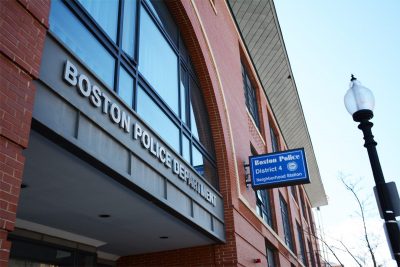
The Office of Police Accountability and Transparency Commission discussed citizen complaints and reform practices and announced plans for future operations at its first community meeting Monday.
At the recommendation of the Boston Police Reform Task Force, OPAT was established by the Mayor’s Office in January to independently investigate and review policing in the city. Three main branches formed within the Office: the Civilian Review Board, the Internal Affairs Oversight Panel and the OPAT Commission.
“The purpose of the OPAT is to provide a single point of entry for individuals with concerns or complaints related to the Boston Police Department and its officers and sworn personnel to be heard and responded to,” the ordinance creating the office states.
This meeting was OPAT’s first since its official inception in the summer when the ordinance creating it took effect. The meeting was rescheduled from its original date one week ago due to a lack of advanced public notice.
Executive Director Stephanie Everett said at the meeting that the OPAT received one abuse of power complaint filed against the Boston Police Department since July 1 Everett also said the office received three anonymous letters including complaints alleging misuse of police overtime and abuse of force, and a general complaint against the police overall.
According to Everett, OPAT is working on further policy prescriptions for BPD, such as use-of-force policies and expanding body camera use.
OPAT is also actively working on finalizing a domestic violence and sexual assault policy in the coming weeks, she added.
The City of Boston and the BPD are cooperating to abide by new policies set forth by the Massachusetts Police Reform Bill and the recommendations of the Boston Police Reform Task Force, Everett said at the meeting.
These new policies include data transparency, creating dashboards that contain information on shootings and in-custody deaths.
“We’re looking forward to being another avenue for our community to engage and help us really do the work that the task force recommendations really set for in the spirit of their work,” Everett said at the meeting.
Members of the community inquired at the meeting about investigating and punishing police misconduct, the lack of staff hired and the release of police data.
“We do encourage information to come in from the community in any form to help guide the work that we are doing at OPAT in the office,” Everett said at the meeting.
Boston Police Department could not be reached for comment by the time of publishing. Everett of the Office of Police Accountability and Transparency could not be reached for an interview by the time of publishing as well.
Tanisha Sullivan, NAACP Boston President and member of the Boston Police Reform Task Force, said in an interview she and other task force members are disquieted by the OPAT’s slow progress.
“[I’m] very concerned about the pace at which both the Civilian Review Board and the Internal Affairs Oversight Panel are being set up,” she said, “because that has had an impact on really the ability of the Office of Police Accountability and Transparency to perform its responsibilities under the law.”
Acting Mayor Kim Janey recently appointed four Bostonians to the Civilian Review Board out of nine seats.
While Sullivan said she hopes Everett is given sufficient support to do her job, she said the onus is on Acting Mayor Kim Janey and the Boston City Council to honor legal obligations set forth by the ordinance that created the OPAT.
“The law requires action by both the Mayor and the City Council,” she said. “It is not the responsibility of [Everett] to appoint members of the Civilian Review Board or the Internal Affairs Oversight Panel … At this point, it’s not about what Ms. Everett has not done, it’s about really the Mayor’s Office and the City Council making the necessary appointments.”
Task force member and community activist Jamarhl Crawford raised concerns at the meeting about the disconnect between the community and the OPAT.
Investigating and reforming the police is a monumental task and the police accountability office deserves some leniency, Crawford said in an interview. However, passionate action must be taken in order to make change and the office currently has too few people to make change.
The lack of public awareness of the newly created entity is causing a breakdown between Bostonians and the OPAT, Crawford said.
“You can only complain to the OPAT, if you know that the OPAT exists,” Crawford said, “and I would submit that most people in Boston are even unaware that this office even exists.”
The OPAT Commission will have its next virtual public meeting Dec. 17.






















































































































